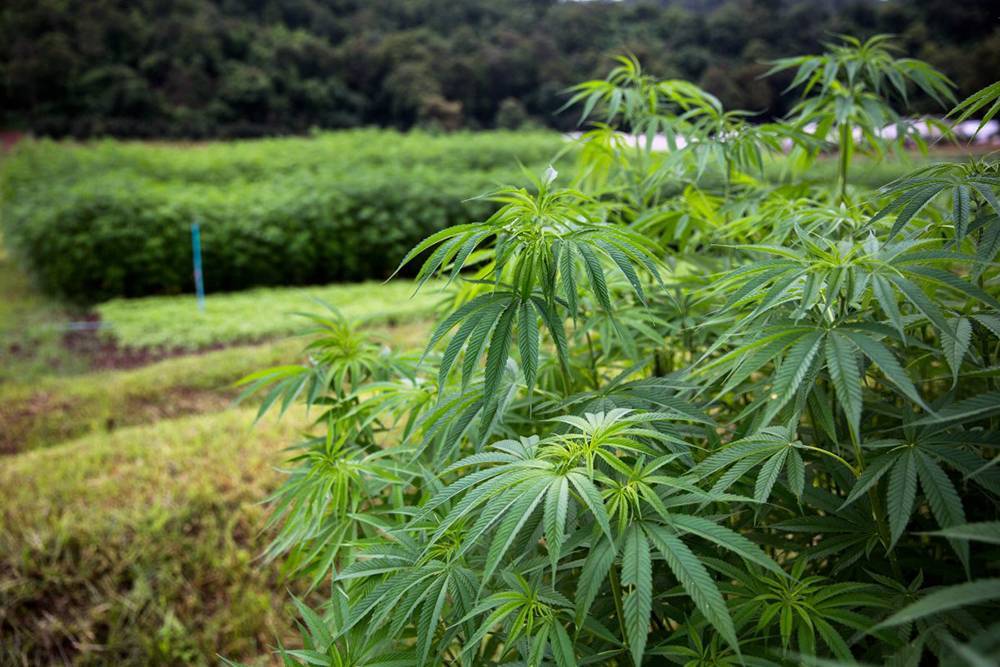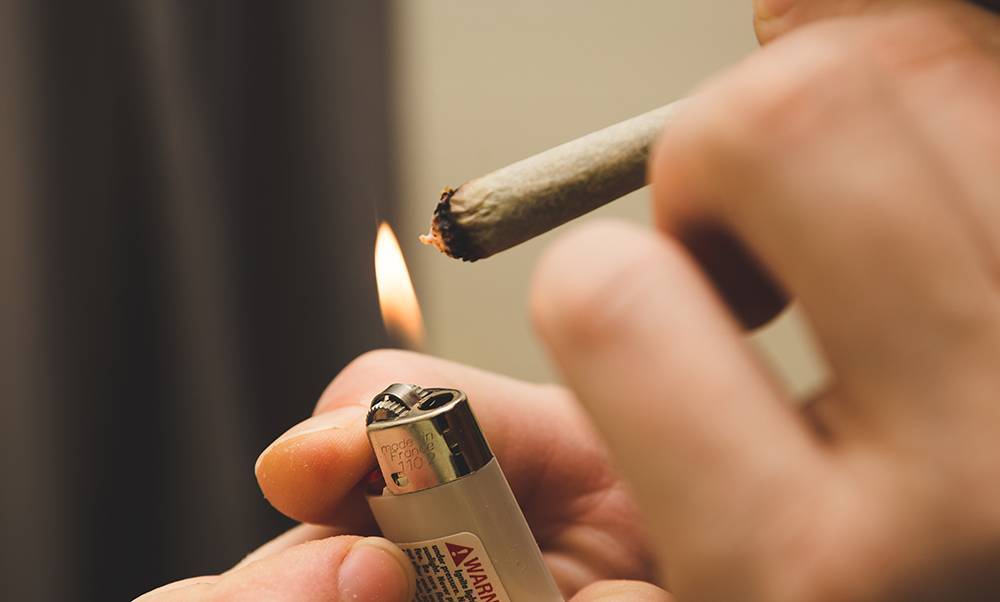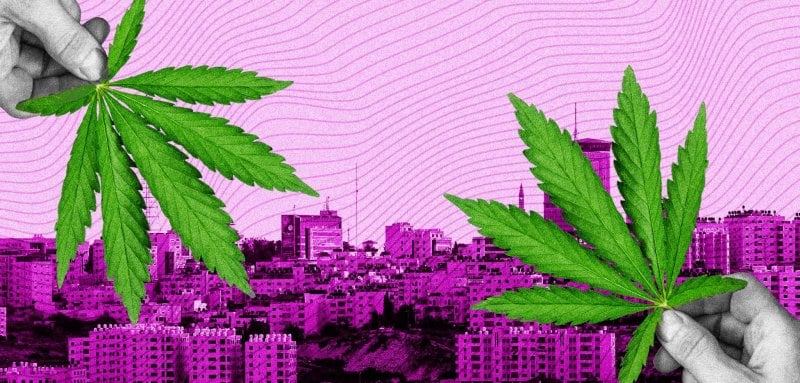The past few years have seen a significant rise in the rates of drug dealing in Palestine, especially following the spread of the ongoing pandemic and the deteriorating economic situation.
Statistics from the ‘Palestinian Police’s Anti-Narcotics Agency’ indicated that the Quds Governorate holds the highest recorded amount of drug seizures at 17.4% of total seizures, followed by the Ramallah Governorate at 16.4%, then Jenin at 11.2%, while Salfit recorded the lowest at 2.2%. Whereas the region’s most known for the cultivation of drugs are Palestine’s Aghwar region and the zone classified as ‘Area C’, where the Israeli occupation retains near exclusive control.
According to the Anti-Narcotics Agency, the cultivation of these substances takes place under the approval and watchful eye of occupation authorities, which encourage this type of agriculture within the borders of the West Bank while consistently combating it internally in occupied Palestinian territories. Given that the majority of drug plantations in Palestine are located in the West Bank, Palestinians then supply the product to Israel.
Despite laws issued against those who plant, traffic, and use these narcotics, their farming is constantly on the rise. Narcotic substances are divided into two kinds: Stimulants (or boosters) and depressants (or sedatives). So how are drugs grown and what are the most common types sold in the West Bank? What are the groups that traffic, use and abuse drugs? Does it provide enough income for a Palestinian worth spending years in jail for; or worth paying large sums of money to trade in? And where does the law stand when it comes to these issues?

Production & Farming Encouraged by Occupation
According to Palestine’s Anti-Narcotics Agency, thousands of drug-trafficking cases have been reported in the West Bank recently. Samir (alias) with the Anti-Narcotics Agency tells Raseef22, “The drugs sold here consist of fig leaves, insecticides and rat poison. "Mr. Nice Guy” is one of the most famous types sold and used in the West Bank. Also grown here are marijuana (cannabis) and ‘hashish’, specifically the kind called ‘Chocolate’.” An incident that occurred in the village of ‘Azzun’ tells the story of a farmer who was planting ‘hashish’ amidst the corn, and concealed it among about two dunums (local unit of measurement) of corn, and he was caught because of the night lights required for the crop which drew attention. The majority of the plant nurseries are close to settlements, they are exposed by the lights and their need for extra irrigation, not to mention the well-known smell of cannabis (or hash) oil, which is easily distinguished by farmers and agricultural specialists.”
Samir adds, “These substances are sold to dealers for huge sums of money. Some of them are made by scraping the wax from the inside of the plant and burning it with sulfur. As for "Mr. Nice Guy”, which is widely sold in the West Bank, it differs from marijuana but is smoked just the same. It is banned in most countries because it dries up a part of the brain. As for the countries that allow their trading, they are only allowed in certain doses and limited quantities.”
It is noteworthy to mention that ‘hashish’ is manufactured from the same substance as "Mr. Nice Guy” in Israel, as well as in the suburbs of Jerusalem (i.e. in areas under Israeli control and supervision). It completely differs from natural cannabis in terms of risks and manufacturing temperatures, since hazardous chemicals are dissolved in ‘Ethanol 95’ or acetone. The dried grass is then sprayed with this mixture until saturated and then left to dry out, and this process is repeated several times in order to increase the concentration of the affecting substance.
What are the most common drugs sold in the West Bank? Who traffics and who consumes? Is the income generated worth the jail term? Where does the law stand?
Opium Plant Instead Of A Damask Rose
The Anti-Narcotics Agency seeks to combat the cultivation of drugs in all its forms in the West Bank and areas under its control, absolutely refusing its farming altogether, since the Israeli occupation pays huge amounts of money to farmers and dealers in order to promote and sell drugs in the West Bank.
Therefore, the agency considers this an onslaught by the occupation aimed at inflicting major damage onto the people of Palestine, not to mention the physical and psychological damage that would be caused by substance abuse.
The agency affirms that the absence of protocols limiting this trend is one of the reasons that led to its rapid spread and easy distribution, making it accessible to everyone of any age group.
Anas Mansour, Director of Investigation at the Junaid Prison in Nablus, recounts to Raseef22 an amusing incident that took place in a Ramallah plant nursery, “One of the flower nurseries in Ramallah - a well-known plantation by the way - bought a large group of Damascus rose saplings from an Israeli merchant. He displayed them in his plant nursery, and they were all sold. After a while, one of the employees of the Anti-Narcotics Agency passed by and smelled the poppy plant (opium) in the backyard of a house in Ramallah. They then arrested the house’s owner on charges of growing opium, to later discover that the Israeli merchant made a mistake during the selling process, and accidentally switched the Damask rose saplings with those of opium. Of course, the Israeli lost huge sums of money because the cost of this type of drug is estimated in the thousands.”
He goes on, “Opium saplings are not very different from those of the Damascus rose. Even before the flower blooms, they slit it to extract its wax, which they burn with sulfur and turn into drugs. Usually a yellow flower would bloom, so it is difficult for the average person to differentiate it from a Damascus rose.”

Escaping Reality?
Many of those who have taken drugs such as these say that stress and life’s problems drove them into the abyss of addiction. The beginning always seems easy and simple enough, but it quickly turns into a spiral of emptiness and mental and physical illnesses that keep the addict from living a decent life.
Osama (alias), 38, tells Raseef22, “Only those who suffer from specific conditions turn to drug abuse. I resorted to it some time ago due to problems between my wife and my mother; I was not able to face either of them. Drugs do not help you forget, nothing helps you forget but death. Drugs only help you escape reality. I have previously taken "Mr. Nice” and “Ket”. I was cured with great difficulty, but the treatment needs nothing but a strong will; while medicine only destroys a person.”
Meanwhile Lo’ai (alias), 19, tells Raseef22, “I was suffering from great amounts of stress lately. My father kicked me out of the house and our economic situation was bad. I worked in many jobs and professions when I was at a young age. I didn't complete my education and didn't feel any responsibility towards anything. Sometimes I think that drugs are helping me get away, and other times I regret taking them. I am trying to take less gradually. I was imprisoned once and released on bail by my friend. I have not fully recovered."
Anas Mansour affirms, “Drug dealing is not yet considered an organized trade in the West Bank, because if it were, it would lead to assassinations of men in law enforcement and heavy consequences. The poor are the most who use and abuse drugs, especially "Mr. Nice" because it is locally manufactured and is cheap and accessible to everyone. These groups deal and use drugs for money or to escape reality, most of whose ages range between 18-22.”
Mansour goes on to say, “They give strange names to drugs in the local dialect, some of which are known, for example, by animal names such as ‘cat’ and ‘dolphin’, while others are called ‘fan’.”
The Anti-Narcotics Agency combats the cultivation of drugs in all its forms in the West Bank, absolutely refusing its farming altogether; The Israeli occupation pays huge amounts of money to farmers and dealers in order to promote and sell drugs in the West Bank
Unprofitable Business
Dealers, however, see this differently, for they do not handle the customer as a human being, but rather only see him as a number and a mere tool to make money.
On another hand, occupation authorities recently paid dealers and farmers large sums of money to grow and sell drugs in various regions of the West Bank, to further their own political agenda.
Amir (alias), 34, reveals to Raseef22, “When I started selling drugs, they were in demand by my friends and acquaintances, and then the circle expanded later. "Mr. Nice" is a type that customers demand a lot, because its effect lasts for a quarter or a third of an hour. I used to deliver it packaged to customers but did not dare try it myself. I have not taken any drugs since I started this business. The demand for this substance increased after the students from internal occupied territories came to universities, because sales had decreased with the pandemic lockdowns."
Speaking of profit, he says, “The drug trade is not profitable, but it does cover some expenses. Circumstances forced me to resort to selling drugs. I earn varying profits from narcotics. I buy one pack for 60 shekels (about 19 US dollars) and sell it for 100 shekels (about 31 US dollars). This depends on the quantity of orders first, and on the type of customer second, because we, as dealers, manipulate prices if the customer is new or has never used before."
Whereas regarding legal prosecution, he states, “The police pursued me more than once, and I was imprisoned many times, the longest of which was 5 months. I was never tried in court during these times. I would always get out on bail.”
Surpass The Law If You Have The Money
The Anti-Narcotics Agency of the Palestinian Police handled 2,132 cases over the course of 2018, registering a 31% increase from the number of cases it had dealt with the previous year.
Its investigations led to the arrest of 2,567 people suspected of drug trafficking, possession, or the promotion of drugs, at a rate of 34%, including 29 females who had a part in the promotion and dealing of narcotics.
Anas Mansour discloses, “When we seize narcotic substances, they are kept by the court and police, and we form a committee to destroy the substances following the verdict. They remain in our possession ahead of the ruling as evidence. Some countries allow drug dealing and personal consumption depending on the law. While some countries, such as Lebanon, Afghanistan and Pakistan, grow its crops in order to make money. As for large countries like Russia and Italy, they maintain this trade because they are unable to control the community.”
Mansour adds, “As for the amended laws, a dealer is sentenced to about 15 years and fined 10,000 dinars (about $ 14,000), in accordance with Article No. (21) of the law regarding drug crimes. As for the buyer, he is sentenced depending on the quantity he was seized with. Evidence and other people’s testimonies affect the verdict, but mainly the quantity that was found in his possession determines the length and nature of the judgment.”
The severity of the penalties heightens for anyone found guilty in Articles 22, 23, 24 and 25. The Anti-Narcotics Agency and Palestinian Police confirm that most of the cases they receive are outside the control of the Palestinian Authority. This is what primarily led to the absence of a deterrent law as well as the weakness of these laws, since it is possible to bypass them completely by paying money to let the defendant out of prison, regardless of his charge and the type of crime he has committed.
The law against growing narcotics only applies to those who don't have money; if you are able to pay large sums, you will escape jail sentence. Other than that, they leave you to rot in prison
A’asem (alias). 54, informs Raseef22, “Years ago, I worked in the drug trade and went to jail three times for drug trafficking and promotion. I would buy the narcotic from my friend who owned his own plant nursery. He bought the saplings from an Israeli dealer and generally had a good relationship with Israeli dealers. He would even supply them with his produce, and they would pay him huge amounts of money in return. The law only applies to those who don't have money; if you are able to pay large sums, you will make it. Other than that, they leave you to rot in prison. Some law enforcement authorities take in the narcotics and claim that they burn or destroy them, but they actually divide them among themselves or sell them to their friends and acquaintances. Therefore, the law is not only biased towards a certain class, but also it is basically non-existent to some people in security services.”
On the other hand, there are no statistics for the number or percentage of women taking drugs, and there are also no treatment centers for women who are addicted; due to their scarceness and their silence in fear of their conservative society’s views towards them.
As for treatment centers for male addicts, they are limited to a small group of centers, which are: the ‘Palestinian National Rehabilitation Center for Drug Addicts’ in Bethlehem, the ‘Opioid Substitution Therapy Clinic (Methadone)’ in Ramallah, the ‘Al-Hoda Association’ in both Jerusalem’s Shu'afat and Ramallah’s Jaba' villages, the ‘Al-Sadiq Al-Taib Association’ in the Jerusalem town of al-Eizariya. Some of the centers are affiliated with the Palestinian Health Ministry, and therefore free of charge, while others are private and depend on admission fees.
Between the destructive policies of the occupation and its indifference to existing laws in the West Bank, the farmer, dealer, or user of these toxic substances finds himself at a loss on what to do. On the one hand, he is neither capable of facing the difficult situation he’s in regarding the region’s occupation and escalating social crises, nor is he capable of escaping the cycle of addiction and trafficking on the other.
Raseef22 is a not for profit entity. Our focus is on quality journalism. Every contribution to the NasRaseef membership goes directly towards journalism production. We stand independent, not accepting corporate sponsorships, sponsored content or political funding.
Support our mission to keep Raseef22 available to all readers by clicking here!
Interested in writing with us? Check our pitch process here!



